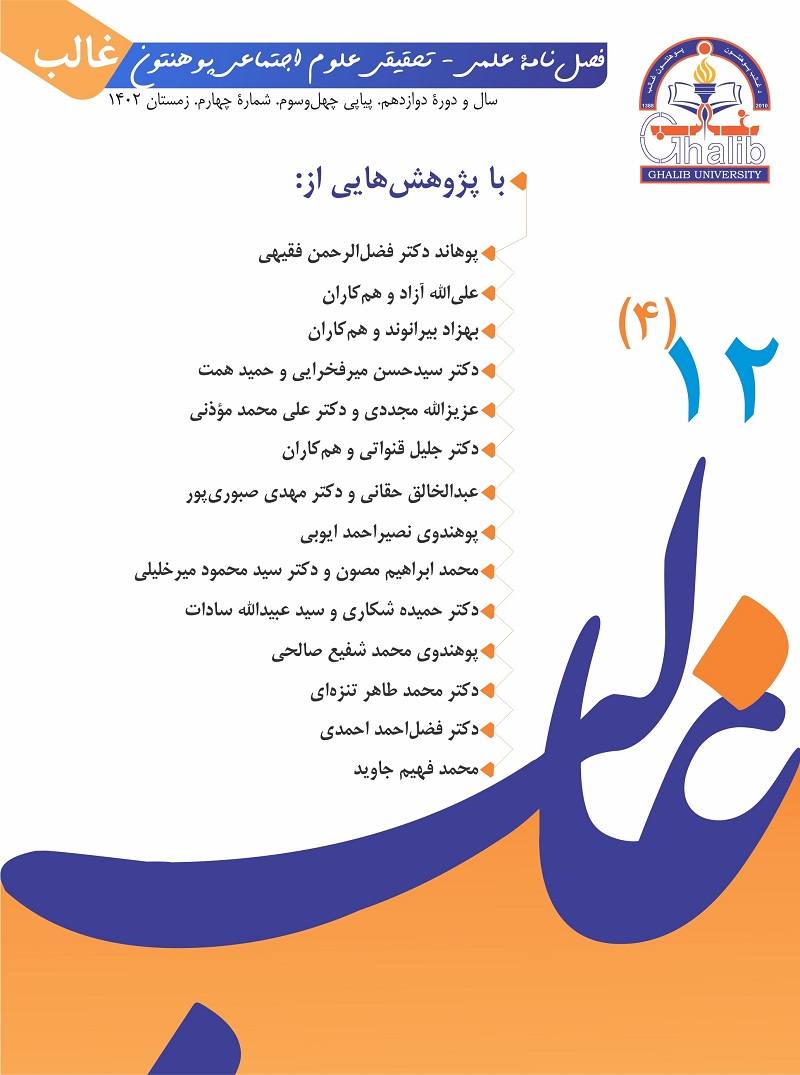Study of the Impact of Organizational Competency on Employees' Professional Ethics in Ministry of Higher Education of in Afghanistan
DOI:
https://doi.org/10.58342/ghalibqj.V.12.I.4.10Keywords:
Organizational Competence, Professional Ethics, Employees, Ministry of Higher Education, AfghanistanAbstract
The aim of this study is to probe the effect of organizational competence on the professional ethics of employees in the Ministry of Higher Education of Afghanistan. Scientific knowledge of the effective factors on the promotion of work ethics, clarifying its various dimensions and criteria due to the significant role that it plays in the realization of all-round development and improvement of productivity. Considering the fact that the body of the administrative system of any organization is made up of its employees and neglecting their administrative and job problems has caused stagnation and underemployment in the organization that leads to customer dissatisfaction. Finally, its consequences are affected by management; For this reason, human resources committed to the goals and values of the organization is the main indicator of the superiority of an organization compared to other organizations, and it increases the effectiveness and efficiency of the organization, and will lead to the progress and development of the society in the face of global changes. The research method is a descriptive survey, and the statistical population of the study was all the employees of the Ministry of Higher Education of Afghanistan, and the sample size is 224 people; the data collection tool is a questionnaire and for the analysis of data, the method of PLS Smart software is used. The results of the research show that the more the organizational competence is improved, the more the professional ethics of the employees will be improved. It can be said that by improving the organizational competence, the cultural dimension, duty and equality of the professional ethics of the employees in the organization can be improved.
References
بوياتزيس. (1995). «شایستهگی و مفاهیم کاربرد آن». مقالات تدبیر، شمارۀ 206.
جوکار، علی؛ فلاح، وحید و سعید صفاریان. (1397). «بررسی رابطۀ شایستهگی مدیران با توسعۀ سازمانی». فصلنامۀ رهبری و مدیریت آموزشی دانشگاه آزاد اسلامی واحد کرمسار. سال 12.
داوری، علی؛ رضازاده، آرش. ( 1392)، مدلسازی معادلات ساختاری با نرمافزار Smart Pls. تهران: انتشارات جهاد دانشگاهی.
رابرتسون، الينان و بارترام. (2002)، «بررسی تاثیر مدیریت دانش بر عملکرد سازمانی». دومین کنفرانس بینالمللی مدیریت و اقتصاد در قرن 21.
سپهوند، رضا؛ شریعتنژاد، علی. (1393). «بررسی تأثیر شایستهگی مدیریتی بر رضایت شغلی و تعهد سازمانی اعضای هیئت علمی و کارکنان دانشگاه های شهر خرم آباد». ایران: مجلۀ مدیریت فرهنگ سازمانی. 12(3 (33))، 505-528. SID. https://sid.ir/paper/510187/fa
عابدی، احمد؛ عریضی سامانی، سیدحمیدرضا و مهدی سبحانینژاد. (1384). «بررسی رابطه بین انگیزش پیشرفت تحصیلی دانشآموزان دورۀ متوسطۀ شهر اصفهان با ویژهگیهای شخصیتی آنان». ایران: مجلۀ دانشور رفتار. 12(12 (ویژه مقالات علوم تربیتی 4))، 29-38. SID. https://sid.ir/paper/46395/fa
فراملکی احد، فرامرز. (1388). «اندر نسبت قانون و اخلاق». ایران: مجلۀ آیین. دورة 24 – 25. https://ensani.ir/fa/article/238193/%D8%A7%D9%86%D8%AF%DB%8C%D8%B4%D9%87-%D9%86%D8%B3%D8%A8%D8%AA-%D9%82%D8%A7%D9%86%D9%88%D9%86-%D9%88-%D8%A7%D8%AE%D9%84%D8%A7%D9%82
قلیچلی, بهروز؛ اسدی قراباغی، مهدی. (1400). «تأثیر نیت و شایستهگیهای تسهیم دانش بر عملکرد شغلی مدیران سازمانهای پروژهمحور (مطالعه موردی: شرکت مدیریت توسعه صنایع پتروشیمی)». ایرن: مجلۀ پژوهشهای مدیریت در ایران. 19(4). 161-184. https://dorl.net/dor/20.1001.1.2322200.1394.19.4.8.2
کرمانی، بهناز؛ حسین، درویش و همکاران. (1395). «روابطه شایستهگیهای رهبری مدیران و کادر اجرایی با عملکرد بیمارستانها». ایران: فصلنامۀ بیمارستان. دوره 15. شماره 4.
کعب عمیر، نوری؛ موسوی، منتهی؛ موسوی، سوسن و عبدالزهرا نعامی. (1397). «ارتباط بین عوامل درونسازمانی مؤثر بر رعایت اخلاق حرفهای توسط پرستاران». ایران: مجلۀ مدیریت پرستاری. 7(1). 9-17. SID. https://sid.ir/paper/523707/fa
کیخا، عالمه؛ زرهی، ابوالفضل و ابراهیم حدادی. (1401). «بررسی نقش اخلاق حرفهیی بر مسؤولیت اجتماعی پرستاران». ایران: مجلۀ آموزش و اخلاق در پرستاری. 5(3), 1-8. doi: 10.52547/ethicnurs.5.3.2
مشایخی، مریم؛ پورملک، محمودآیاد؛ سعید. (1396). «نقش اخلاق حرفهای در مدیریت آمورشی». ایران: فصلنامۀ مدیریت و کارآفرینی. دوره 3. شماره 1. https://civilica.com/doc/721389
References
Boyatzis (1995). "Competence and concepts of its application". Tadbir articles, number 206.(in persian)
Jokar, Ali; Falah, Vahid and Saeed Safarian. (2017). "Investigating the relationship between managers' competency and organizational development". Leadership and Educational Management Quarterly of Islamic Azad University, Karamsar branch. Year 12. No. (in persian)
Dauri, Ali; Rezazadeh, Arash. (2012), structural equation modeling with Smart Pls software. Tehran: Jihad Daneshgahi Publications. (in persian)
Robertson, Elinan and Bartram. (2002), "Investigating the impact of knowledge management on organizational performance". The second international conference on management and economics in the 21st century. (in persian)
Sephovand, Reza; Shariatnejad, Ali. (2013). "Investigation of the effect of managerial competence on job satisfaction and organizational commitment of faculty members and employees of Khorram Abad universities". Iran: Journal of Organizational Culture Management. 12(3 (33)), 505-528. SID. https://sid.ir/paper/510187/fa (in persian)
Abedi, Ahmed; Ereghi Samani, Seyyed Hamidreza and Mehdi Sobhaninejad. (1384). "Investigation of the relationship between the motivation of the academic progress of middle school students in Isfahan city and their personality traits". Iran: Daneshvar Behavat magazine. 12(12 (special educational science articles 4)), 29-38. SID. https://sid.ir/paper/46395/fa (in persian)
Faramalki Ahad, Farmarz. (1388). "The relationship between law and morality". Iran: Ayan magazine. Session 24-25. https://ensani.ir/fa/article/238193/%D8%A7%D9%86%D8%AF%DB%8C%D8%B4%D9%87-%D9%86%D8 %B3%D8%A8%D8%AA-%D9%82%D8%A7%D9%86%D9%88%D9%86-%D9%88-%D8%A7%D8%AE%D9%84% D8%A7%D9%82(in persian)
Qlicheli, Behrouz; Asadi Qarabaghi, Mehdi. (2021). "The effect of knowledge sharing intention and competencies on the job performance of managers of project-oriented organizations (Case study: Petrochemical Industries Development Management Company)". Iran: Journal of Management Research in Iran. 19(4). 161-184. https://dorl.net/dor/20.1001.1.2322200.1394.19.4.8.2(in persian)
Kermani, Behnaz; Hossein, Darvish et al. (2015). "The relationship between the leadership competencies of managers and executive staff with the performance of hospitals". Iran: Hospital Quarterly. Period 15. Number 4. (in persian)
Kaab Umair, Noori; Mousavi, Mantehi; Mousavi, Sosan and Abdulzahra Noami. (2017). "Relationship between internal organizational factors affecting the compliance of professional ethics by nurses". Iran: Journal of Nursing Management. 7(1). 9-17. SID. https://sid.ir/paper/523707/fa(in persian)
Kikha, Alame; Zarehi, Abolfazl and Ebrahim Haddadi. (1401). "Investigating the role of professional ethics on the social responsibility of nurses". Iran: Journal of Education and Ethics in Nursing. 5(3), 1-8. doi: 10.52547/ethicnurs.5.3.2(in persian)
. 12. Mashayikhi, Maryam; Pourmelk, Mahmoud Ayad; Saeed. (2016). "The role of professional ethics in scientific management". Iran: Management and Entrepreneurship Quarterly. Volume 3. Number 1. https://civilica.com/doc/721389(in persian)
Downloads
Published
How to Cite
Issue
Section
License
Copyright (c) 2023 Hamideh Shekari

This work is licensed under a Creative Commons Attribution 4.0 International License.













